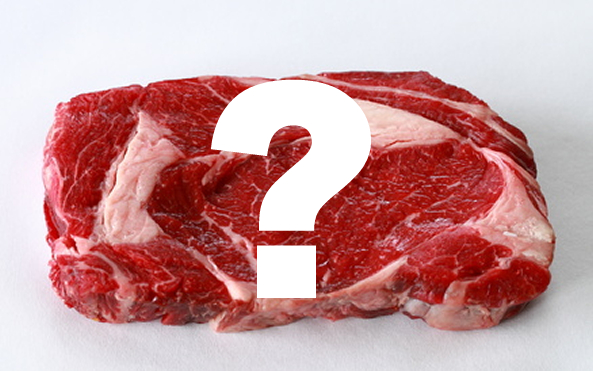Bad news for red meat: A study published in the Archives of Internal Medicine concludes that red meat consumption is associated with an increased risk of total, cardiovascular and cancer death.
Should you remove red meat from your diet?
First, let’s review the published information from the study.
This study is actually an analysis of the data from two long-running studies (from the 1980s until 2008,) involving over 121,000 men and women. These individuals were free of cardiovascular disease and cancer at baseline. Their diet was assessed by food frequency questionnaires and updated every 4 years.
The results of the study showed that on average, each additional serving of red meat the participants ate was associated with a 13% higher risk of dying. Processed meat numbers were worse. Each additional serving raised a person’s risk of dying by 20%.
It also states that replacing 1 serving of red meat per day with healthier protein sources, including “poultry, nuts, legumes, low-fat dairy and whole grains,” would have resulted in 7% to 19% lower mortality risk. If all of the individuals had eaten less than a half serving of red meat a day, they estimate that 9.3% of deaths in men and 7.6% of deaths in women could have been prevented.
Based on this information, and the hair-raising headlines in the media, many individuals have sworn off red meat.
But does this study show that red meat causes chronic disease and cancer?
The Problem with Observational Studies
Investigative health reporter Gary Taubes, author of Good Calories, Bad Calories, and Why We Get Fat, wrote a detailed blog post titled Science, Pseudoscience, Nutritional Epidemiology and Meat.
In this post he explains that association is not causation. Just because eating a certain food is associated with a certain outcome does not mean it causes the outcome. This has been proven time and time again, when researchers attempt to prove a causal relationship from the results of an observational trial, and the experiment fails. This is because multiple confounders are at play, including obesity, sedentary lifestyle, smoking, alcohol consumption and higher calorie intake. And even when study authors try to correct for them, they cannot correct for what Taubes calls the “compliance effect,” which cannot be measured.
And he brings up another problem with observational studies:
“Science is ultimately about establishing cause and effect. It’s not about guessing. You come up with a hypothesis — force x causes observation y — and then you do your best to prove that it’s wrong. If you can’t, you tentatively accept the possibility that your hypothesis was right. Peter Medawar, the Nobel Laureate immunologist, described this proving-it’s-wrong step as “the critical or rectifying episode in scientific reasoning.”… The problem with observational studies like those run by Willett and his colleagues is that they do none of this. That’s why it’s so frustrating. The hard part of science is left out and they skip straight to the endpoint, insisting that their interpretation of the association is the correct one and we should all change our diets accordingly.”
So . . . this study does not prove that red meat causes an early death.
So, should you reduce or eliminate your read meat intake?
Too Much Meat
There is little doubt that Americans are eating too much meat – be it red or pink or white. For improved health, some physicians are recommending that we reduce our red meat consumption to less than two or three servings a week.
Dr. Dean Ornish, founder and president of the Preventive Medicine Research Institute explains why more plants in our diet can reduce our risk of premature death. “There are literally hundreds of thousands of protective substances that you find in fruits and vegetables and whole grains and legumes and soy products that prevent disease.”
Grass-Fed vs. Conventionally Raised Beef
Other experts would argue that the real question is about where the red meat comes from. There are significant differences between red meat from animals that come from concentrated animal feeding operations (CAFOs) and organically raised, grass-fed beef. What an animal eats affects the end product.
Meat from CAFOs, where animals are fed GMO corn and pesticide sprayed grains, and pumped full of antibiotics and hormones is far different from meat that comes from cattle that eat what they were meant to eat – grass. Grass-fed beef is lower in saturated fat, higher in omega-3s, beta-carotene, vitamin D, B-vitamins, and minerals such as calcium, magnesium and potassium. It is also higher in CLA, a cancer fighter.
So is red meat deadly or delicious?
A Personal Decision
My personal belief is that the “healthiness” of red meat depends on the quality, the amount, and how it is prepared. In our home, I have greatly reduced our meat consumption, including red meat, replacing it with protein from legumes and other plants. Our health has absolutely benefited, allowing us to attain a healthy weight and enjoy increased energy. Eating more vegetables than meat will certainly reduce our chances of developing chronic disease that can lead to an early death.
As a certified health coach, I leave the decision of whether or not to consume red meat up to my clients. Every individual is different, and no one diet works for everyone. Some people feel better when they include small amounts of red meat in their diet. There are a growing number of individuals making the switch to organic, grass-fed beef, both for the health of the animal and the environment. And some choose to eliminate red meat altogether.
Whatever your choice, include lots of vegetables, fruits and grains, and your health will benefit.









Leave A Comment